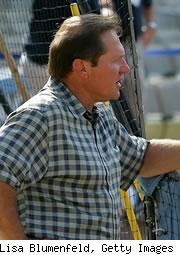
Uber Agent Points Out that There Are Two Sides to Every Story
By Mike Takeuchi
(This interview was taken on August 19, two days after Boras client, former San Diego State pitcher Stephen Strasburg signed for a record $15.1 million over four years. The top three picks, Strasburg, Dustin Ackley, the former University of North Carolina outfielder(Mariners), and high school outfielder (Padres) Donavan Tate were the top three picks in the draft. All are Boras' clients. Boras was at Chavez Ravine checking up on Manny Ramirez and the Cardinals' then latest addition, Matt Holliday.)
While pundits have for better or worse named Scott Boras as the most influential man in baseball, owners and man fans have used language only printable in Penthouse to condemn him as the anti-Christ who is destined to bring Armageddon to their beloved pastime. A recent conversation with Boras at Dodger Stadium revealed a man who wanted to set the record straight.
Boras, who grew up in northern California while rooting for the likes of Mickey Mantle and Willie Mays, is a lifelong fan of the game whose fondest memory is seeing the athleticism of Mays close-up and the experiencing the kindness of another Giants great Willie McCovey in person.
The former minor league infielder, who began his current profession by negotiating contracts for a not-yet perennial All-Star Keith Hernandez in the early 1980’s, currently represents a roster of talent that could contend for the World Series. With a client list that includes Alex Rodriguez and Manny Ramirez Boras has drawn admirers and detractors alike due to his aggressive style-most recently with the holdouts of draft picks that included the much coveted Stephen Strasburg.
While acknowledging that baseball, to the tune of 5% of players he represents, has been very, very good to him, the 56 year old pointed out that it is a two-way street in terms of player contracts. After Strasburg signed with the Washington Nationals for $15.1 million over four years, the calls for a salary cap along with Boras’ head on the blogs intensified. When this was brought up, Boras was quick to respond.
“My opinion is if they don’t put a cap on revenue, why should they put a cap on salaries?” Boras asked. “The quid pro quo of the game is that in 1990, baseball made $1 billion dollars, in 2000 they made three, and last year, it was a record $6.5 billion. No owner is going to put salaries into a player or players that will put his position in peril. That would be bad business. And the playing field, although not even, is made easier by revenue sharing of teams that aren’t as well managed or don’t have the market of others.
“Everyone is doing really well with that formula working. I don’t know why you would change it because the franchise values for each team have gone up.”
While Forbes Magazine verified that the revenue numbers back Boras statement, the article stated that the 2009 Major League Opening day rosters had a salary of just over $2.6 billion-not including minor leaguers. Also, in 2008, the Yankees, the Red Sox, and the Toronto Blue Jays were the only teams that reported losses-but all three were profitable thanks to substantial media packages.
“In baseball we have an agreement that 50% goes to the players, who are hugely responsible for making the profits, and 50% goes to the owners in an equitable situation,” Boras said. “And because of this, I honestly don’t see any kind of reform happening soon because revenue is at or above last year’s record season.”
When it was pointed out that the revenues will drop off due to an expected 17- 20% attendance decrease (according to veteran baseball journalist Peter Gammons) due to the poor economy across the board, Boras thinks that the sport will be less affected over the long haul.
“In the economy you need to look at a specific industry as opposed to looking at the general economy, and baseball is doing very well comparatively,” Boras said. “Attendance is down, but I think baseball will bounce back.”
When I asked him about Joe Fan, I got the answer I was expecting from any media savvy spokesperson.
“Baseball continues to be more affordable than the other sports,” Boras said. “I think that, its frequency, more chances for a personal connection with the players will keep people coming to the park.”
I cynically said that I hope he was right. I'm not sure if he heard me.
No comments:
Post a Comment